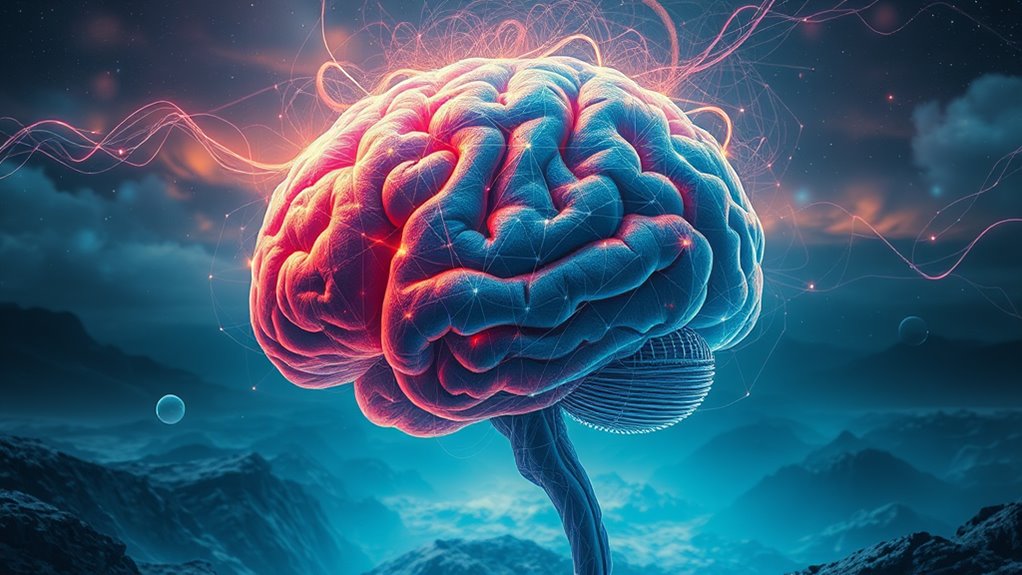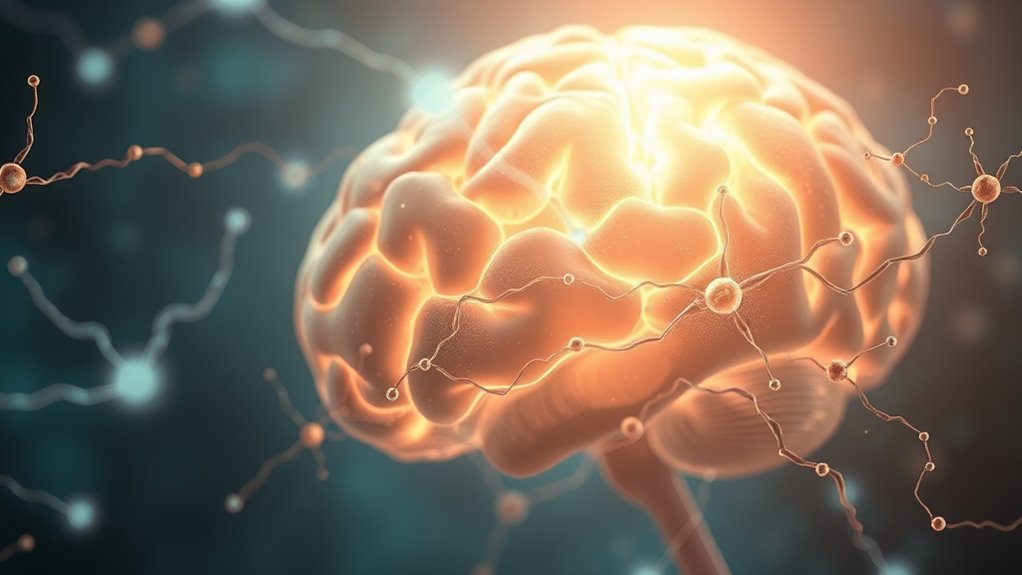When you forget a thought, it doesn't just disappear. Instead, your brain engages complex processes that alter how memories are formed and recalled. The hippocampus plays a vital role in connecting short-term and long-term memories, while the prefrontal cortex helps with intentional forgetting. Factors like interference from new information and changes in the brain due to aging contribute to memory loss. Your thoughts fade through various neural mechanisms, but they're not gone forever. There's much more about how memories shift and disappear that can help you understand this intriguing process better.
Essential Insights
- Forgotten thoughts may fade from implicit memory, remaining unrecognized until retrieval attempts occur.
- Interference from new information can disrupt memory encoding and retrieval, contributing to forgetting.
- Active suppression of unwanted memories engages specific brain regions, leading to weakened recall of those thoughts.
- The hippocampus, crucial for memory processing, may fail to retrieve forgotten thoughts due to its dysfunction.
- Neuroplasticity allows the brain to reorganize and adapt, influencing how memories form, fade, and are ultimately forgotten.
The Nature of Forgetting

When you think about forgetting, it's fascinating to realize how complex the process really is. Forgetting isn't just a simple failure to recall; it encompasses various mechanisms that your brain employs to manage memory.
One significant aspect is interference theory, which suggests that conflicting information can disrupt your stored memories. This disruption can occur at any stage—whether during encoding, consolidation, or retrieval. For instance, if you learn something new that clashes with what you already know, you may experience retroactive interference, making it harder to access prior knowledge.
Another layer of this complexity is implicit memory, where some memories fade without your conscious awareness. You mightn't realize that certain details are slipping away until you try to recall them. Interestingly, memory encoding is the initial stage of memory formation, and issues during this phase can significantly impact your ability to remember.
Additionally, memory suppression plays an essential role in your forgetting process. This active mechanism helps you intentionally set aside unwanted memories, often engaging your brain's frontal control regions.
You might wonder why you can't simply will yourself to remember everything. The truth is, your brain naturally prioritizes crucial information, discarding the rest. This process helps prevent cognitive overload and allows you to focus on what matters most.
Whether you're facing proactive interference from earlier learned material or recognizing induced forgetting after recalling a specific memory, you're witnessing the intricate nature of forgetting at work. Your brain's ability to forget, while sometimes frustrating, is a necessary part of maintaining a healthy cognitive environment.
Neural Mechanisms at Play

Understanding the neural mechanisms at play during intentional forgetting reveals how your brain actively manages memory. When you decide to forget something, your brain engages specific cortical processes to weaken those memories. This involves a complex interplay between various brain regions, particularly the right dorsolateral prefrontal cortex and the hippocampus.
As you actively suppress a memory, you'll notice an increase in activity in the right dorsolateral prefrontal cortex, which helps reduce hippocampal activity and weakens the targeted memories.
Here are some key points about these processes:
- Increased Activity: The right dorsolateral prefrontal cortex shows heightened activity during intentional forgetting.
- Memory Weakening: This increased activity reduces the engagement of the hippocampus, which is essential for memory retrieval.
- Sensory Activation: You can also achieve intentional forgetting by moderately activating memories in the ventral temporal cortex.
- Predictive Processing: The degree of memory processing in these areas can predict how successfully you forget a memory. Recent studies have shown that moderate activation in the ventral temporal cortex can lead to a higher likelihood of forgetting.
Your strategies for intentional forgetting, whether through direct suppression or thought substitution, don't change this consistent pattern of increased memory processing.
Instead, they highlight how your brain adapts to manage and prioritize information. By understanding these neural mechanisms, you gain insight into the active role your brain plays in shaping your memory landscape.
Role of the Hippocampus

The hippocampus plays an essential role in how you form and retrieve memories, acting as a bridge between short-term and long-term memory. It's critical for converting your short-term memories into lasting ones, shifting them to other brain regions for long-term storage. The hippocampus handles what's known as hippocampal functions, like pattern separation and pattern completion, which help you make sense of your experiences by sorting perceptions effectively. Research has established that exercise training is linked to increased hippocampal size and improved memory, further emphasizing the importance of this structure in cognitive health.
As you navigate your environment, the hippocampus also aids in spatial navigation, allowing you to understand your position relative to surrounding objects. During the initial stages of memory consolidation, the hippocampus is actively involved in synaptic consolidation, strengthening connections made shortly after learning. This process continues over weeks and years, altering memories to become independent of the hippocampus.
When it comes to memory retrieval, the hippocampus is essential. It activates during the recall of episodic memories, especially when you use partial cues to trigger the recollection of details. This engagement facilitates the reinstatement of sensory information in the neocortex, helping you reconstruct memories that might otherwise feel fragmented.
However, if there's a dysfunction in the hippocampus, it can hinder your ability to retrieve these memories effectively, leading to forgetfulness or confusion. Therefore, a healthy hippocampus is essential for both forming new memories and successfully recalling them when you need them.
Brain Regions Involved

Numerous brain regions contribute to the complex process of forgetting, each playing a unique role in how memories are managed and sometimes erased. Understanding these regions can enhance your grasp of memory retrieval and cognitive load. Here are four key players in the forgetting process:
- Prefrontal Cortex: This area regulates forgetting by controlling memory processes and influences hippocampal activity, playing an essential role in voluntary forgetting.
- Hippocampus: While important for memory formation, its activity can be altered during forgetting, working closely with the prefrontal cortex to manage the process.
- Neocortex: Eventually, this region stores memories permanently, reinforcing connections over time and making them independent of the hippocampus.
- Medial Temporal Lobe (MTL): This area acts as a relay station for multiple cortical regions involved in memory encoding and is vital for memory consolidation.
These brain regions collectively handle the cognitive load associated with remembering and forgetting. The prefrontal cortex's coordination with the hippocampus helps to switch frequencies during active forgetting, effectively suppressing unnecessary memories. Importantly, the process of memory involves acquiring, storing, and retrieving information, with two types of memory: short-term and long-term.
Meanwhile, the neocortex guarantees that essential memories become stable over time. Damage to any of these areas can lead to significant memory deficits, underscoring their importance in the overall memory landscape.
Neuroplasticity and Memory Change

Neuroplasticity is a fascinating aspect of brain function that allows it to adapt and change in response to experiences, considerably influencing how memories form and fade. This remarkable ability helps you enhance your memory and recover from cognitive challenges. Understanding neuroplasticity effects provides insight into how your brain rewires itself, ultimately shaping your learning and memory. Additionally, structural plasticity involves physical changes in neurons, which can significantly enhance memory retention as you engage in new learning experiences.
Here's a summary of some key types of neuroplasticity:
| Type of Neuroplasticity | Description |
|---|---|
| Homologous area adaptation | Reorganizes nearby areas to compensate for damage. |
| Compensatory masquerade | Uses different pathways to achieve the same function. |
| Cross-modal reassignment | Reassigns functions from one sensory modality to another. |
| Map expansion | Expands neural maps in response to new experiences. |
Mechanisms like synaptogenesis, neurotransmitter release, and electrical activity are essential for memory enhancement. As you learn and adapt, your brain modifies neural circuits, reinforcing connections that support memory retention. Engaging in activities such as exercise and maintaining a healthy diet can further stimulate these neuroplastic changes, leading to improved cognitive functions.
In practical terms, applying the principles of neuroplasticity can help you harness your brain's potential. By embracing new learning experiences and challenging yourself, you actively promote memory enhancement and cognitive resilience. Ultimately, understanding neuroplasticity empowers you to take charge of your mental sharpness and adaptability.
Aging and Memory Decline

Aging's impact on memory can be stark, as structural changes in the brain begin to unfold early in adulthood. You might notice that your memory isn't as sharp as it once was, partly due to the natural aging effects on your brain.
The prefrontal cortex, cerebellum, and hippocampus—key areas for memory—start to shrink in your 30s or 40s, with the rate increasing around age 60. As the cerebral cortex thins, especially in the frontal and temporal lobes, cognitive functions and processing speed can be affected.
Here are some common aging effects on memory:
- Reduced Memory Formation: Shrinkage of the hippocampus impairs your ability to form and retrieve memories.
- Slower Processing Speed: Cognitive decline often leads to slower processing and sensory responses.
- Increased Sensitivity to Stress: Older adults may find that stress and distractions hinder their memory recall.
- Higher Dementia Risk: The risk of developing Alzheimer's or other dementias increases considerably with age. Moreover, age-related cognitive decline can manifest through difficulties in decision-making as well.
To combat memory decline, it's essential to adopt effective memory strategies. Engaging in regular mental exercises, maintaining social connections, and practicing mindfulness can help preserve cognitive function.
Additionally, managing chronic health conditions and reducing exposure to toxins like alcohol may also play a significant role in sustaining your memory as you age. By being proactive, you can better navigate the challenges of aging and memory decline.
Memory Consolidation Process

Memory consolidation is an essential process that transforms fleeting experiences into lasting memories. It occurs in two main stages: synaptic consolidation and systems consolidation.
Synaptic consolidation happens within hours of learning. During this phase, late-phase long-term potentiation kicks in, enhancing synaptic strengthening and solidifying neural connections. This initial process requires protein synthesis, fundamental for memory stabilization.
As you continue to engage with the information, systems consolidation takes over, which can span weeks to years. This stage involves transferring memories from the hippocampus, where they're initially stored, to the neocortex for permanent storage. The hippocampus plays a critical role in binding various cortical regions during memory encoding and activates the neocortex, allowing memories to become independent of its influence.
Throughout these phases, repeated retrieval of information strengthens the synaptic pathways, making it easier for you to access those memories later on. Techniques like rehearsal and spaced repetition can greatly enhance the memory consolidation process.
By revisiting and practicing the learned material, you're not only reinforcing synaptic connections but also improving long-term retention. Visual cues, chunking information, and creating associations with existing knowledge can further aid in this process.
All these elements contribute to a more robust memory system, ensuring that those fleeting thoughts have a chance to evolve into enduring memories, ready for retrieval whenever you need them.
The Impact of Emotion

Emotions play a crucial role in shaping how effectively you encode and recall memories. When you experience strong emotions, the brain's amygdala and hippocampus work together to enhance memory consolidation. This interaction means that emotional memories are often retained longer and recalled more vividly than neutral ones.
Here are some key impacts of emotion on memory:
- Emotion Regulation: Your ability to manage emotions can influence how well you remember information. Positive emotional states can enhance cognitive control, leading to better memory recall.
- Memory Enhancement: Emotional experiences trigger neural processes that reinforce memory consolidation, especially during sleep and wakefulness. This means that emotionally charged moments stick with you over time.
- Contextual Influence: Your current mood affects what you're likely to remember. If you're in a positive mood, you may recall happier memories more easily, while negative moods can narrow your focus and impair recall.
- Cognitive Focus: Emotions can broaden or narrow your attention. A positive emotional state often allows for a broader focus, improving problem-solving, whereas negative emotions can limit your cognitive capacity.
Strategies for Better Recall

To enhance your ability to recall information, it's essential to adopt various strategies that target both your physical and mental well-being. By integrating memory techniques into your daily routine, you can greatly improve your recall enhancement. Here are some effective strategies:
| Strategy | Benefits | Tips |
|---|---|---|
| Physical Exercise | Boosts neuroplasticity and cognition | Engage in moderate aerobic activities, like brisk walking or cycling. |
| Mindfulness & Meditation | Reduces stress, enhances focus | Meditate for 20 minutes a day; even short sessions can help. |
| Retrieval Practice | Strengthens memory and aids integration | Regularly test yourself on learned material to fortify recall. |
Regular physical exercise doesn't just keep your body fit; it enhances memory performance and supports cognitive health. Pairing that with mindfulness practices can reduce stress, which is essential for maintaining clarity. Just 20 minutes of meditation over a few days can lead to noticeable improvements in your memory.
Additionally, engaging in retrieval practice allows your brain to actively work on integrating and consolidating memories, making them easier to access later. Remember, lifestyle adjustments matter too. Eating balanced meals, getting adequate sleep, and managing your weight can greatly support overall cognitive function.
Frequently Asked Questions
Can Forgetting Be Beneficial for Mental Health?
Forgetting can definitely be beneficial for your mental health. It helps you prioritize important information while discarding unnecessary details that weigh you down.
This mental clarity allows you to think better and make decisions more effectively. By letting go of painful memories and resentments, you reduce emotional burdens and create space for new, positive experiences.
Embracing the benefits of forgetting enables you to enhance your overall well-being and fosters a healthier mindset.
How Do Emotions Influence What We Remember or Forget?
Did you know that emotionally charged events are remembered up to 7 times better than neutral ones? Your emotional intensity directly influences memory consolidation, making those feelings stick.
Stress impacts how you recall memories, often amplifying trauma recall.
Meanwhile, nostalgia effects can brighten your mood, reshaping how you remember past events.
Ultimately, your emotional state influences what you remember or forget, highlighting the complex connection between feelings and memory.
Is There a Difference Between Intentional and Unintentional Forgetting?
Yes, there's a significant difference between intentional and unintentional forgetting.
Intentional forgetting involves specific memory mechanisms where you actively suppress or replace memories, reducing cognitive load. You can employ strategies like thought substitution to manage what you remember.
In contrast, unintentional forgetting occurs automatically, often when accessing a related memory leads to the loss of others. This happens without your control and can happen even when you don't want it to.
What Role Does Sleep Play in Forgetting Memories?
Imagine your mind's a cluttered attic, full of old memories. Sleep's like a skilled organizer, playing an important role in memory consolidation.
During different sleep stages, it helps you refine and prune neural connections, strengthening what's essential while letting go of the noise. This process enhances your cognitive function, ensuring you retain fundamental information.
Without adequate sleep, your brain struggles to manage memories, leading to a chaotic mental space that hampers learning and recall.
Are There Specific Techniques to Enhance Memory Retention?
To enhance memory retention, you can use various memory techniques like mnemonic devices, which create associations to aid recall.
Incorporate spaced repetition and active recall to strengthen your memory over time.
Visualization strategies help you picture concepts clearly, while chunking information makes complex data manageable.
Engaging your senses through sensory engagement can deepen memory connections.
Additionally, practicing mindfulness can improve focus, further enhancing your ability to remember important information effectively.
